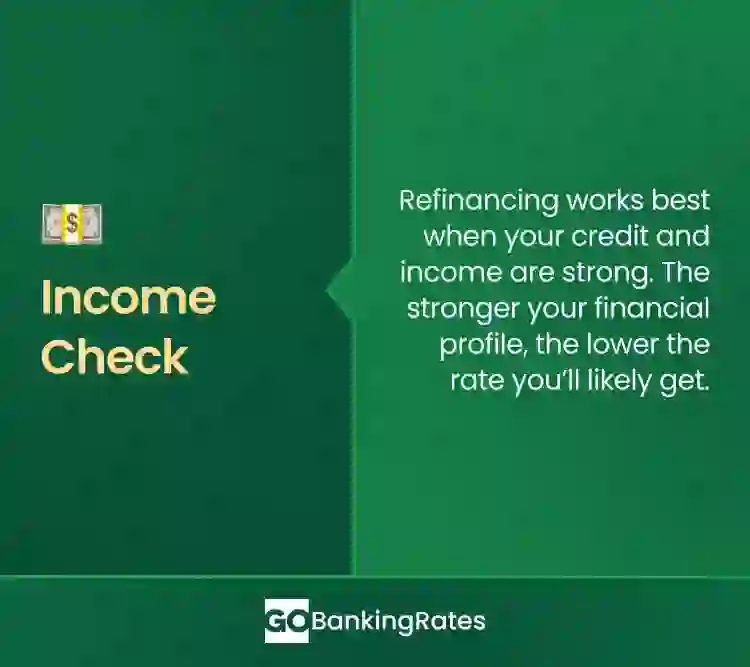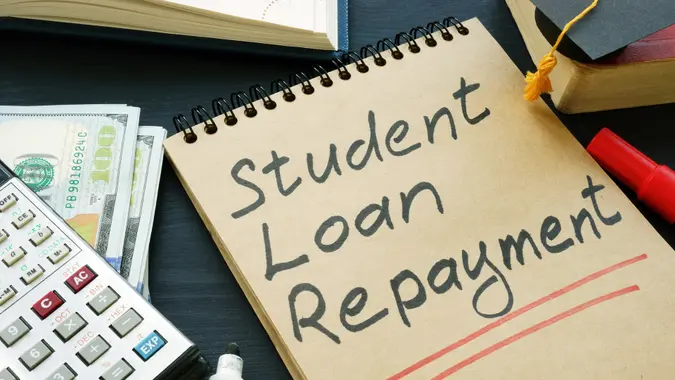Should I Refinance My Student Loans? How To Decide

Commitment to Our Readers
GOBankingRates' editorial team is committed to bringing you unbiased reviews and information. We use data-driven methodologies to evaluate financial products and services - our reviews and ratings are not influenced by advertisers. You can read more about our editorial guidelines and our products and services review methodology.

20 Years
Helping You Live Richer

Reviewed
by Experts

Trusted by
Millions of Readers
One of the best ways to cut costs on interest and manage your student loan debt is to consider refinancing. Refinancing your student loan means taking a loan from a private lender who pays your existing student debt and implements different terms and rates.
While it can be an excellent solution to reducing what you pay over time, refinancing is not an option for everyone and comes with potential caveats.
It’s not a question of “should I refinance my student loans,” but rather “when to refinance student loans,” which varies depending on your needs and financial goals. These include the strength of your credit score, loan amount limits and whether you have a stable job.
What Happens When You Refinance a Student Loan?
Refinancing your student loan means replacing your existing student loan with another from a private lender, such as a bank. Some of the key changes that happen when you make the switch include:
New Lender, New Rules
While the switch doesn’t change the fact that you must still pay off the loan, a new lender means new terms and different interest rates. Usually, people switch because they want to lower their interest rates or change the loan’s repayment length.
Effect on Pre-Existing Benefits
Depending on your student loan type, you may need to forgo some benefits from the initial loan, such as losing your federal benefits if you’re refinancing a federal loan.
Credit Score Impacts
Refinancing a student loan incurs a hard inquiry into your credit history. While this incurs a temporary score reduction, it will eventually go back up if you make on-time payments and adequately manage your credit.
Is Refinancing Student Loans a Good Idea? Pros and Cons
Refinancing student loans is a good idea in theory, but it’s not a one-size-fits-all option. There are some pros and cons that you must consider before switching to refinancing.
Pros of Refinancing
- Lower interest rates: Refinancing reduces the interest rate you pay, saving you money over time.
- Lower monthly payments: Refinanced loans reduce your overall monthly debt payment, giving you more financial flexibility.
- Shorter loan terms: With shorter loan terms, you can pay off your debt faster instead of being locked in for years or even decades.
- Option to remove a cosigner: Refinancing your loan comes with the option of removing a cosigner on your debt. This option eliminates the cosigner’s responsibility and gives you peace of mind.
Cons of Refinancing
- Loss of federal protections: If you took out a federal student loan, refinancing with a private lender means missing out on potential forgiveness programs or income-driven repayment.
- Need for strong credit and stable income: If you want to qualify for the best refinancing rates and term lengths, you must have good credit and stable income.
- Potential fees: Some refinancing options may come with potential fees and restrictions. Others may be more rigid when it comes to payment flexibility.
When To Refinance Student Loans: The Best Time to Act
Now that you know the potential benefits and drawbacks, you may wonder, “Should I refinance my student loans?” Deciding when to refinance student loans means reviewing your financial circumstances to determine the best time to act.
Gauge your financial situation honestly and review your payment and income history. If your credit score and income are steadily improving, that’s the first indicator that refinancing is an option.
Another factor to consider is interest rates and whether they have dropped significantly. Refinancing may slash the monthly cost of your debt substantially if you have a private student loan with high rates.
Suppose you took on a federal student loan. In that case, it’s time to determine whether any loss of benefits — present or future — is worth the switch and how that may tie to your occupational longevity.
When Not to Refinance Your Student Loans
In some cases, you should not take on a refinancing loan for your student debt.
It is not a good time to act if you rely on income-driven repayment plans that manage your payments based on how much you make and your family size. Refinancing removes those benefits and obliges you to pay a fixed amount regardless of your situation.
Another condition to avoid refinancing is if you are pursuing Public Service Loan Forgiveness, since you will no longer qualify to have your debt forgiven.
Determine whether you need deferment or forbearance due to inconsistent work or income, as refinancing does not give you these options.
Lastly, it is better not to take on refinancing if you won’t qualify for a lower interest rate, since one of the main reasons to switch is to reduce monthly payments.
How Refinancing Compares to Federal Student Loans
When deciding whether to stick with federal student loans or refinance into a private loan, it helps to see the differences side by side. Below is a breakdown of the key features — like interest rates, repayment options, and forgiveness programs — so you can quickly compare what each option offers.
| Feature | Federal Student Loans | Refinanced Private Loans |
|---|---|---|
| Interest Rates | Fixed, set by the government | Based on credit score, may be lower |
| Loan Forgiveness | Available (PSLF, IDR forgiveness) | Not available |
| Income-Driven Repayment | Yes | No |
| Deferment/Forbearance | Yes, in case of hardship | Varies by lender |
| Eligibility | Anyone with federal loans | Requires good credit and stable income |
How To Refinance Student Loans: 7 Steps
1. Check Your Credit Score
Your credit score affects the interest rates offered to you on the new loan. Aim for a credit score of 670 or higher for the best rates.
2. Compare Lenders
You have multiple student loan refinancing options, so don’t skimp on the research. Compare offers for the lowest rates, flexible terms, and minimal-to-no fees.
3. Get Prequalified
Getting prequalified helps you view the potential rates you will be offered without impacting your credit score with a hard inquiry.
4. Gather Necessary Documents
Keep proof of income, loan details and credit history information on hand for easy access.
5. Apply
You must fill out your personal information and undergo a credit check once submitted.
6. Review and Accept the Loan Offer
After receiving the terms and rates of your offer, keep it on hand to compare it with other offers you may have searched for previously. Once you decide, accept the offer that best suits your circumstances.
7. Ensure Old Loans Are Paid Off
Your credit score will recover from the hard inquiry as soon as you start making payments on the new loan and manage the existing debt you may have with on-time payments.

Alternatives to Refinancing Student Loans
If refinancing your student loan is not an option, there are still a few alternative routes to take in the meantime. These include:
Federal Loan Consolidation
If you have more than one federal student loan, you can merge them into one loan to streamline the payment process. This consolidation lets you keep the federal benefits of your loan, but doesn’t lower your interest rate.
Income-Driven Repayment Plans
These payment plans may take longer to pay off, but they reduce your monthly student federal loan payments based on your situation. Income-driven repayment plans are a lifesaver when you have an unstable income or your familial situation changes.
Employer Repayment Assistance Programs
Some employers have programs that help you pay off your student debt. You can check whether your job offers these programs, or if you are unemployed, you can look for jobs that provide this benefit.
Making Extra Payments
You can make additional payments to help reduce your debt or choose a refinancing plan later when your eligibility increases for the best rates.
Should You Refinance Your Student Loan? FAQs
Need more answers on refinancing student loans? Take a look:- Will refinancing my student loans hurt my credit?
- Refinancing student loans reduces your credit score temporarily because it triggers a hard inquiry into your credit history. With on-time payments and solid credit management, your score will eventually go back up.
- Can I refinance student loans more than once?
- You can refinance student loans multiple times without worrying about how often you can do it. It could be a good option to refinance more than once if you get better rates as your financial situation improves.
- What credit score do I need to refinance student loans?
- To get the best rates and terms, aiming for a credit score of 670 or higher is best. Like most loans, refinancing loans rely on your payment habits and history to determine the interest rates you will pay.
- Should I refinance my federal student loans?
- Refinancing a federal student loan may come with better terms and rates. Still, it strips you of any benefits you may receive from your initial federal loan, like flexibility in repayment and potential loan forgiveness.
- How much money can I save by refinancing?
- The amount you will save by refinancing your student loan depends on your loan amount, the new loan's terms and new interest rates. However, you can potentially save a significant amount and pay it off much sooner than you would with your original loan.
- Do I need a cosigner to refinance my student loans?
- One of the benefits of refinancing your student loan is that you do not need a cosigner. You can remove the responsibility on an existing cosigner by taking control of your debt.
Our in-house research team and on-site financial experts work together to create content that’s accurate, impartial, and up to date. We fact-check every single statistic, quote and fact using trusted primary resources to make sure the information we provide is correct. You can learn more about GOBankingRates’ processes and standards in our editorial policy.
- Citizens Bank. "Should I refinance my private or federal student loans? If so, how?"
- Association of American Medical Colleges. 2024. "Should You Refinance Your Student Loans?"
- LendingTree. 2025. "Refinance student loans."
- Laurel Road. 2025. "The Pros and Cons of Refinancing Student Loans."
- Consumer Financial Protection Bureau. 2024. "Should I consolidate or refinance my student loans?"
 Written by
Written by  Edited by
Edited by 
























